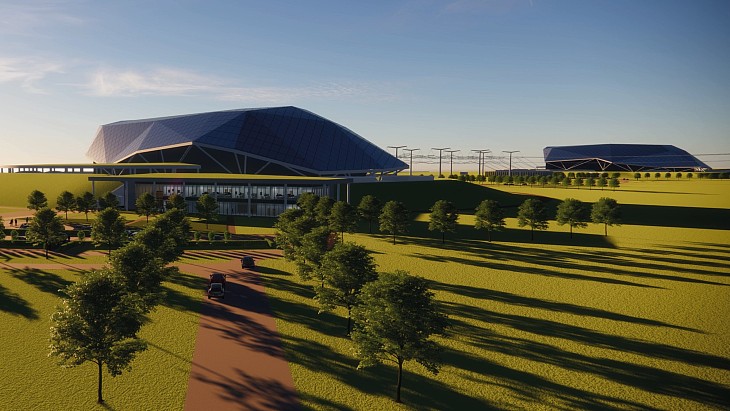PreussenElektra - which is responsible for the decommissioning of eight nuclear power plants in Germany - announced that the cooling towers were "successfully and safely demolished" at 7.55pm on 16 August.
The blasting had been planned for 5.30pm but was delayed after a 36-year-old pro-nuclear protester scaled an electricity pylon near the towers in protest at their demolition.
A total of 1340 electronic detonators and 260 kilograms of explosives were used to bring down the two towers, PreussenElektra said.
The blasting resulted in around 55,000 tonnes of rubble, mainly concrete. The concrete rubble will first be processed and a large part of it - about two-thirds - will be used to fill one of the two cooling tower bases. This area will later be used as a storage area for materials from the dismantling of the Grafenrheinfeld plant. The remainder of the concrete rubble as well as plastics and metals will be recycled.
In order to ensure safe demolition, the Grafenrheinfeld plant (KKG) project team began the complex planning and preparation work almost two years ago.
Grafenrheinfeld plant manager Bernd Kaiser said: "My thanks today go especially to the demolition expert Ulrike Matthes and her team from the Thuringian Explosives Company, as well as to everyone involved in the KKG, especially the project manager Matthias Aron. A big thank you also goes to all the emergency services, the police, the Schweinfurt district office, the surrounding communities and all the other authorities involved, with whom we have worked very constructively in recent weeks and months."
"With today's demolition, we have changed the well-known silhouette of Grafenrheinfeld forever and created space for something new," said PreussenElektra CEO Guido Knott. "In parallel with the well-progressing dismantling of the plant, we are already working on a sensible and value-adding development of the site. Together with our partners and local stakeholders, we want to promote ideas primarily in the field of energy generation and storage that will benefit our employees and the region."
The 1275 MWe (net) pressurised water reactor achieved first criticality in December 1981 and was connected to the grid in the same month. It entered commercial operation in June 1982.
In August 2011, the 13th amendment of the Nuclear Power Act came into effect, which underlined the political will to phase out nuclear power in Germany. As a result, eight units were closed down immediately: EnBW’s Phillipsburg 1 and Neckarwestheim 1; EOn's Isar 1 and Unterweser; RWE's Biblis A and B and Vattenfall's Brunsbüttel and Krümmel. As part of the 13th amendment to Germany's Nuclear Power Act, Grafenrheinfeld lost its authorisation for power operation and was finally shut down on 27 June 2015.
PreussenElektra applied for the decommissioning and first dismantling permit in 2014 and received it in 2018. In this first approval procedure, the company described in detail the concept for the entire dismantling of the system and the measures planned for this. PreussenElektra split the application for the individual dismantling scopes into two steps. The dismantling of the plant began in April 2018 with the granting of the decommissioning and dismantling permit. The second dismantling permit, which was granted in December 2022, for which the application was submitted in December 2019, includes the dismantling of the reactor pressure vessel and the biological shield surrounding it.
PreussenElektra has posted a video of the demolition on its YouTube channel.

.jpg)



_19544_40999.jpg)


_66668.jpg)





